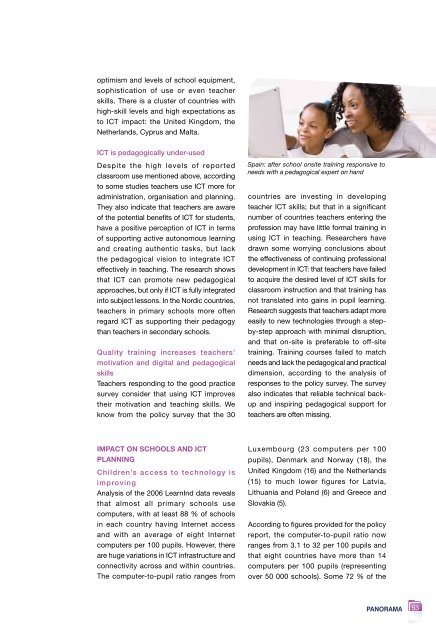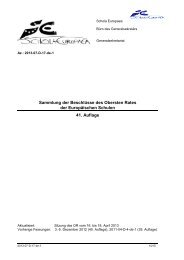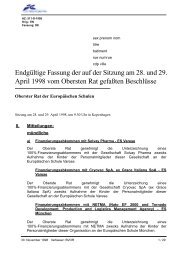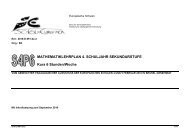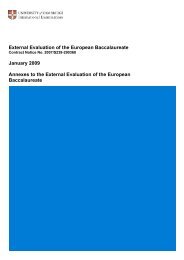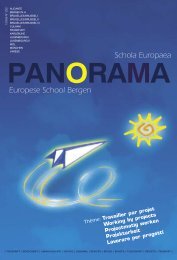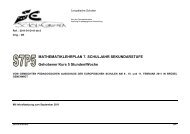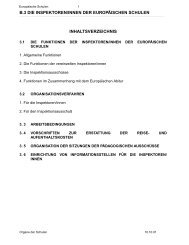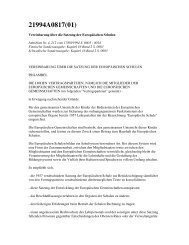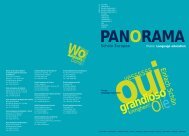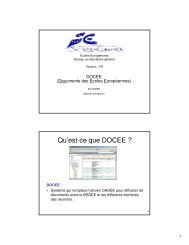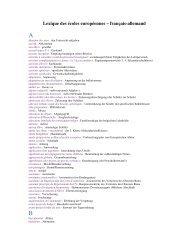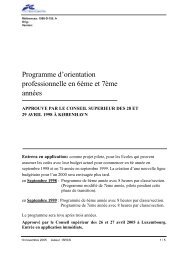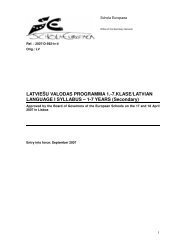Schola Europaea European School Brussels II
Schola Europaea European School Brussels II
Schola Europaea European School Brussels II
Create successful ePaper yourself
Turn your PDF publications into a flip-book with our unique Google optimized e-Paper software.
optimism and levels of school equipment,<br />
sophistication of use or even teacher<br />
skills. There is a cluster of countries with<br />
high-skill levels and high expectations as<br />
to ICT impact: the United Kingdom, the<br />
Netherlands, Cyprus and Malta.<br />
ICT is pedagogically under-used<br />
Despite the high levels of reported<br />
classroom use mentioned above, according<br />
to some studies teachers use ICT more for<br />
administration, organisation and planning.<br />
They also indicate that teachers are aware<br />
of the potential benefits of ICT for students,<br />
have a positive perception of ICT in terms<br />
of supporting active autonomous learning<br />
and creating authentic tasks, but lack<br />
the pedagogical vision to integrate ICT<br />
effectively in teaching. The research shows<br />
that ICT can promote new pedagogical<br />
approaches, but only if ICT is fully integrated<br />
into subject lessons. In the Nordic countries,<br />
teachers in primary schools more often<br />
regard ICT as supporting their pedagogy<br />
than teachers in secondary schools.<br />
Quality training increases teachers’<br />
motivation and digital and pedagogical<br />
skills<br />
Teachers responding to the good practice<br />
survey consider that using ICT improves<br />
their motivation and teaching skills. We<br />
know from the policy survey that the 30<br />
IMPACT ON SCHOOLS AND ICT<br />
PLANNING<br />
Children’s access to technology is<br />
improving<br />
Analysis of the 2006 LearnInd data reveals<br />
that almost all primary schools use<br />
computers, with at least 88 % of schools<br />
in each country having Internet access<br />
and with an average of eight Internet<br />
computers per 100 pupils. However, there<br />
are huge variations in ICT infrastructure and<br />
connectivity across and within countries.<br />
The computer-to-pupil ratio ranges from<br />
Spain: after school onsite training responsive to<br />
needs with a pedagogical expert on hand<br />
countries are investing in developing<br />
teacher ICT skills; but that in a significant<br />
number of countries teachers entering the<br />
profession may have little formal training in<br />
using ICT in teaching. Researchers have<br />
drawn some worrying conclusions about<br />
the effectiveness of continuing professional<br />
development in ICT: that teachers have failed<br />
to acquire the desired level of ICT skills for<br />
classroom instruction and that training has<br />
not translated into gains in pupil learning.<br />
Research suggests that teachers adapt more<br />
easily to new technologies through a stepby-step<br />
approach with minimal disruption,<br />
and that on-site is preferable to off-site<br />
training. Training courses failed to match<br />
needs and lack the pedagogical and practical<br />
dimension, according to the analysis of<br />
responses to the policy survey. The survey<br />
also indicates that reliable technical backup<br />
and inspiring pedagogical support for<br />
teachers are often missing.<br />
Luxembourg (23 computers per 100<br />
pupils), Denmark and Norway (18), the<br />
United Kingdom (16) and the Netherlands<br />
(15) to much lower figures for Latvia,<br />
Lithuania and Poland (6) and Greece and<br />
Slovakia (5).<br />
According to figures provided for the policy<br />
report, the computer-to-pupil ratio now<br />
ranges from 3.1 to 32 per 100 pupils and<br />
that eight countries have more than 14<br />
computers per 100 pupils (representing<br />
over 50 000 schools). Some 72 % of the<br />
PANORAMA 53


